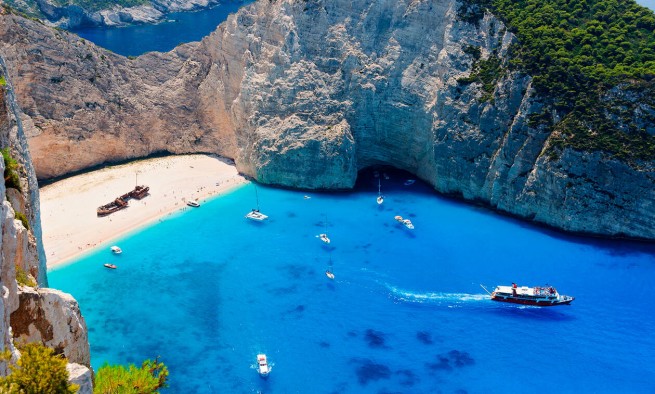
For those who love natural beauty, rich history, fascinating culture, warm hospitality and delicious food, the Greek islands are the perfect place to visit any time of the year.
Greece is known for its crystal clear waters and stunning beaches, ancient ruins such as castles, temples and amphitheatres, and enchanting landscapes including steep banks, lush forests and picturesque villages. With so many islands to choose from in Greece, each with its own charm and character, there is something for everyone here!
Holidu, holiday rental booking portalanalyzed Google searches made by Greeks over the past year to identify most popular islands in greece. This means that you can take a break from your daily routine and make wonderful memories by heading to the islands that the Greeks themselves aspire to visit.
- Santorini – 112,700 monthly Google searches
Santorini is officially the most popular Greek island according to the Greeks themselves. The beautiful volcanic island of the Aegean Sea and its unique geology create some of the most incredible natural landscapes! It is famous for its breathtaking sunsets, which generously gives, black sand beaches and crystal clear waters, picturesque hilltop villages. Santorini has a unique atmosphere that is hard to describe and is waiting for you to discover it.
- Lefkada – 73,600 monthly Google searches
Second place goes to Lefkada. It is an island located in the Ionian Sea on the western coast of Greece. Lefkada is known for its beautiful golden beaches with crystal clear waters such as Egremni, Porto Katsiki, Katisma and Agios Nikitas. Visitors can also explore the island’s mountain villages, enjoy cycling, hiking and other outdoor activities. The island is easily accessible by car as it is connected to mainland Greece by a bridge. This makes it easier for tourists to get to know the island and its many attractions.
 Lefkada
Lefkada
3. Corfu – 73,600 monthly Google searchesAnother island in the Ionian Sea is in third place and that’s Corfu! This island boasts a varied landscape, from pristine beaches to steep mountains and lush forests. Corfu has a rich history reflected in its architecture and museums. It is worth noting that it has been inhabited since ancient times and has been influenced by various cultures including the Greeks, Romans, Venetians and British. Visitors can sample traditional Greek cuisine, local festivals and the island’s vibrant nightlife.
4. Zakynthos – 67,600 monthly Google searches
The island with the most famous beach of Navagio is in fourth place, and this, of course, is Zakynthos. This island in the Ionian Sea with deep blue waters and sandy beaches is ideal for a carefree holiday in any season. Beyond Navagio is another famous beach, Gerakas, which is a protected nesting area for loggerhead sea turtles. The Blue Caves, located on the northwest coast of the island, are a sight not to be missed! Zakynthos is easily accessible by ferry from the Greek mainland and other nearby islands, as well as by plane, as there are flights from several major European cities.
5. Mykonos – 67,600 monthly Google searches
This year, Mykonos ranked fifth among the most popular islands in Greece. This island is known for its vibrant nightlife with many clubs, bars and restaurants open until late at night. Of course, there are many beautiful beaches here, from secluded bays to lively hangouts, the most famous of which are Paradise Beach, Super Paradise Beach and Psarou Beach. Mykonos is famous for its traditional architecture with whitewashed houses and colorful doors. The city of Mykonos, also called “Chora”, with its picturesque alleys and squares, is ideal for exploring it.
Methodology:
The study was conducted by the company Holidayby first collecting a list of all the islands in Greece, and then checking the average monthly Google search volume for “island name” in Greek and English among Greek residents over the past 12 months. The results were then combined to show the average number of monthly searches in both languages. In situations where the total number of search queries was equal, an additional cognate Greek keyword was used to determine the winner.





























































